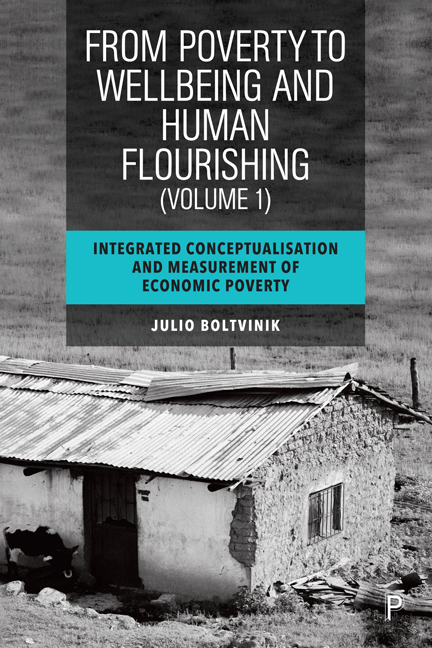 From Poverty to Well-Being and Human Flourishing
From Poverty to Well-Being and Human Flourishing Published online by Cambridge University Press: 28 March 2024
The external critique of the Political Economy of Poverty (PEP) presented in successive sections in this and the following chapter comprises six aspects: Sen’s and Rawls’s critiques of utilitarianism, complemented by the former’s critique of the opulence approach (OA) and other related approaches (Section 2.1); an internal and external critique of Neoclassical Consumer Theory (NCT) (Section 2.2), which complements the critique of utilitarianism; a very brief summary of the critiques of Sen’s (and Nussbaum’s) capability approaches developed in Broadening Our Look (Section 2.3); a summary presentation of the New Paradigm of Poverty and Human Flourishing (NPPHF) (Section 2.4); a critique of conventional definitions of poverty (Section 3.1); and a comparison of what I have called the conceptual maps of the PEP and of the NPPHF (Section 3.2). Unlike the internal critique I have been formulating for over 30 years, and which is presented in Part II of this book, the one discussed in these two chapters is not a critique of measurement methods and their public policy implications but rather an external critique that focuses on the conceptual foundations of the PEP. In Sections 3.1 and 3.2 the critique contrasts the criticised positions with the NPPHF, which makes its external character evident.
2.1 Sen’s and Rawls’s critiques of utilitarianism: Sen’s critique of opulence and primary goods approaches
Amartya Sen defines utility theories as those that see value only in individual utility, defined in terms of a psychological metric such as pleasure or happiness. According to this interpretation, the moral importance of needs (N) is based solely on the notion of utility, says Sen, who distinguishes utilitarianism from welfarism. The former seeks to maximise total social utility by equalising everyone’s marginal utilities, while the latter posits utility as the single value but does not seek to maximise total social utility.
According to Sen, if one accepts the prior principle that the equality of the total utilities of all persons is valuable, then utilitarianism should be condemned. Sen introduces here human diversity, a concept that is repeated time and time again in his work, and which in this case explains that equating the total utilities of each person yields different results than equating their marginal utilities.
To save this book to your Kindle, first ensure [email protected] is added to your Approved Personal Document E-mail List under your Personal Document Settings on the Manage Your Content and Devices page of your Amazon account. Then enter the ‘name’ part of your Kindle email address below. Find out more about saving to your Kindle.
Note you can select to save to either the @free.kindle.com or @kindle.com variations. ‘@free.kindle.com’ emails are free but can only be saved to your device when it is connected to wi-fi. ‘@kindle.com’ emails can be delivered even when you are not connected to wi-fi, but note that service fees apply.
Find out more about the Kindle Personal Document Service.
To save content items to your account, please confirm that you agree to abide by our usage policies. If this is the first time you use this feature, you will be asked to authorise Cambridge Core to connect with your account. Find out more about saving content to Dropbox.
To save content items to your account, please confirm that you agree to abide by our usage policies. If this is the first time you use this feature, you will be asked to authorise Cambridge Core to connect with your account. Find out more about saving content to Google Drive.